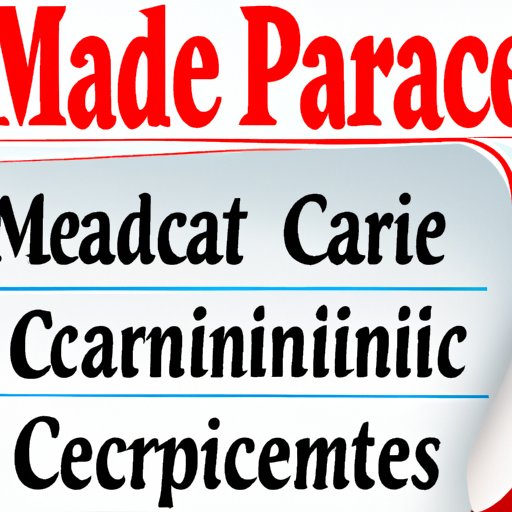
Introduction
Medicare Part C, also known as Medicare Advantage, is a popular health insurance option for many Americans who qualify for Medicare benefits. It offers an alternative to traditional Medicare coverage and provides additional benefits such as vision, dental, and prescription drug coverage. However, the question of whether Medicare Part C is free continues to be a common concern among potential enrollees.
The Ultimate Guide to Understanding Medicare Part C: Is It Really Free?
Medicare Part C differs from Parts A and B in that it is offered through private insurance companies approved by Medicare. These companies offer a range of plans with different benefits, providers, and costs. While some Medicare Advantage plans have a $0 monthly premium, others charge a premium in addition to the Medicare Part B premium.
It is important to note that even if you enroll in a Medicare Advantage plan with a $0 premium, you will still have to pay the Part B premium. In 2021, the standard Part B premium is $148.50 per month. However, if your income is above a certain threshold, you may have to pay a higher premium.
Additionally, Medicare Advantage plans often have out-of-pocket costs such as deductibles, copayments, and coinsurance. Some plans have a maximum out-of-pocket limit, while others do not. It is important to carefully review the plan details and compare costs before choosing a Medicare Advantage plan.
While some Medicare Advantage plans may be free or low-cost, others can be quite expensive. It is important to understand the costs associated with Medicare Part C before enrolling.
Debunking the Myths: The Truth About Medicare Part C and Its Costs
One common misconception about Medicare Part C is that it covers all medical costs and requires no additional payments. This is not true. While Medicare Advantage plans offer additional benefits beyond what is covered by Parts A and B, they also have different cost-sharing requirements.
Additionally, Medicare Advantage plans may have different networks of providers than traditional Medicare, which could impact your access to care. It is important to research and compare plans to ensure that you choose one that fits your healthcare needs.
Is Medicare Part C Worth the Cost? Here’s What You Need to Know
The value of Medicare Part C depends on your individual healthcare needs and financial situation. For some individuals, a Medicare Advantage plan may offer more comprehensive coverage and a lower overall cost. For others, traditional Medicare may be a better fit.
It is important to consider factors such as your health status, prescription drug needs, and budget when choosing a Medicare plan. Additionally, it may be helpful to review plan ratings and talk to your healthcare providers before making a decision.
A Comprehensive Look at the Pros and Cons of Medicare Part C
Some potential advantages of Medicare Part C include:
– Additional benefits such as vision, dental, and prescription drug coverage
– Potential cost savings compared to traditional Medicare
– Coordination of care through a single plan
However, there are also potential disadvantages such as:
– Limited provider networks
– Out-of-pocket costs such as deductibles and copayments
– Potential changes in coverage and benefits from year to year
It is important to weigh these factors when choosing a Medicare plan and ensure that you select one that meets your individual needs.
How to Get the Most Out of Medicare Part C Without Breaking the Bank
To maximize your Medicare Part C benefits while still keeping costs low, consider the following tips:
– Choose an in-network provider to reduce out-of-pocket costs
– Take advantage of wellness benefits such as gym memberships and health screenings
– Review your plan annually and compare your options to ensure you have the best coverage for your healthcare needs
Additionally, you may qualify for financial assistance through programs such as Extra Help or Medicare Savings Programs if you meet certain income and asset requirements.
Exploring the Ins and Outs of Medicare Part C: Paying for Health Care in Your Golden Years
Medicare Part C is an important aspect of retirement planning, as healthcare costs can be a significant expense in later years. It is important to understand the costs and benefits of Medicare Part C and how it fits into your overall retirement plan.
Consider working with a financial advisor or using online resources to estimate your healthcare costs in retirement and develop a plan to ensure that you can afford the care you need.
Conclusion
While Medicare Part C is not always free, it can provide affordable and comprehensive health coverage for eligible individuals. Understanding the costs and benefits of Medicare Part C and weighing them against your individual needs is an important step in making an informed healthcare decision. By doing your research and carefully considering your options, you can choose a Medicare plan that fits your needs and budget.




